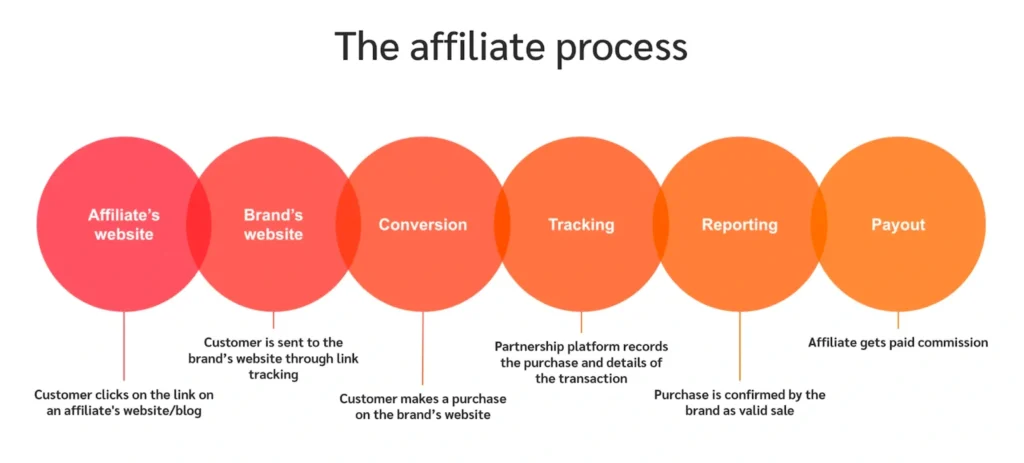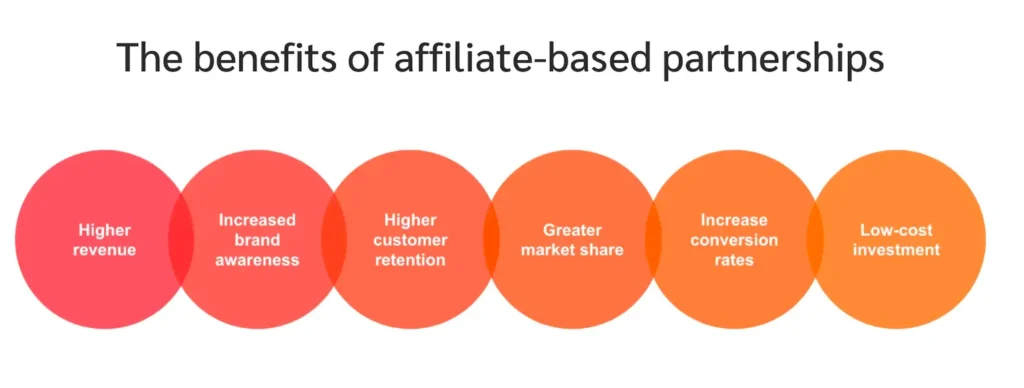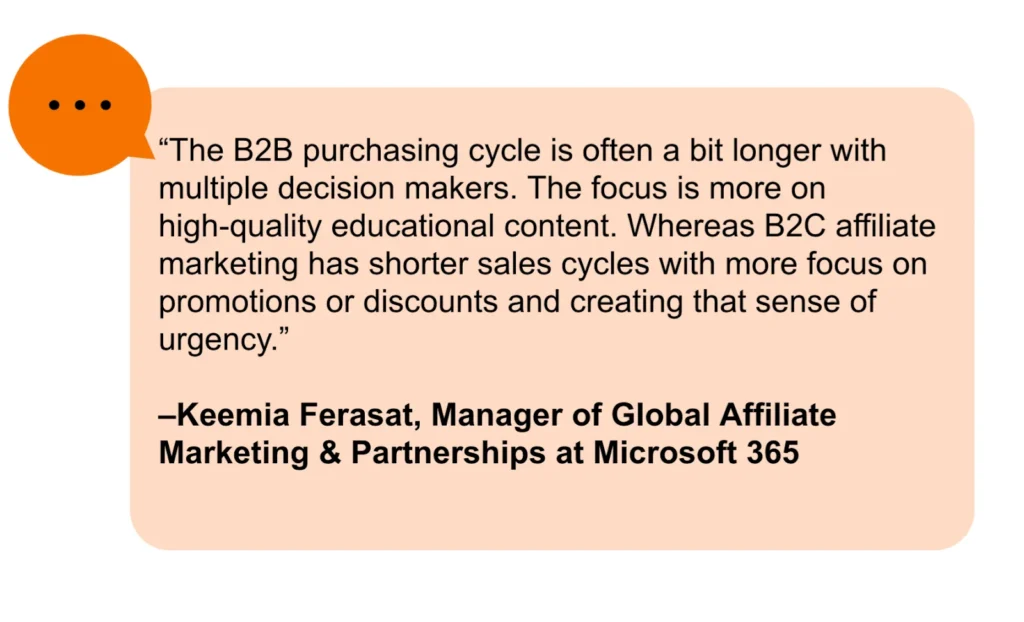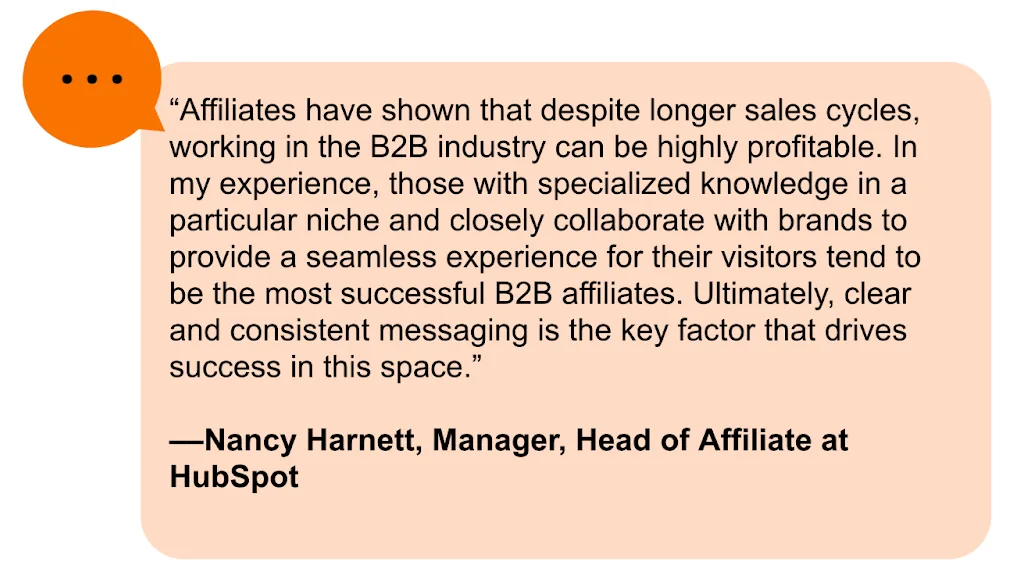Are you a B2B software marketer interested in launching an affiliate program? If you’re facing resistance from key stakeholders when launching an affiliate program for your B2B SaaS company, they might be questioning uncertain outcomes.
However, you can advocate for affiliate marketing as a cost-effective channel where you compensate partners upon achieving pre-defined goals like sales conversions. Moreover, affiliates play a vital role in boosting brand visibility and generating revenue.
Take the popular CRM platform, HubSpot. The business noted challenges when managing its B2B affiliate program. These challenges included a lack of reporting and data, difficulty paying affiliates accurately and on time, and needing help finding the right partners. HubSpot teamed up with impact.com to gain deep reporting and tracking insights, pay partners easily with Dynamic Payouts, and recruit relevant partners faster. The result was a 50% increase in affiliate revenue and signups.
HubSpot proves that affiliate marketing and SaaS go hand-in-hand when you take the right steps—while allowing automation to drive key decisions. Now, let’s take a look at common myths about B2B SaaS affiliate marketing and explore how to successfully create and manage these programs.
SaaS affiliate marketing partnerships amplify revenue and awareness
SaaS affiliate marketing is a performance-based marketing channel where affiliates promote products on behalf of brands. Each time an affiliate reaches a predefined goal, the brand pays the affiliate(s) that helped drive that goal.
Brands lean into affiliate partnerships to highlight product strengths and expand brand reach. One of the key benefits of affiliate partnerships is they help build and inspire communities to spread the word about your software.

Here’s how the customer journey plays out for B2B consumers when affiliate marketing is involved:
- Initial research: The potential customer begins researching different solutions by browsing the internet. They seek insights into the different features of each solution and compare various options to find what suits their business’s needs.
- Recommendations from others. The buyer digs deeper and finds publishers sharing their experiences using these platforms. This feedback provides a personal touch and has the potential to sway opinions on what solution to purchase.
- Deal hunting: After weighing all the pros and cons, a customer decides on a solution. They now hunt for deals online and click a link to purchase. They may find these links on the brand’s website or an affiliate link on a third-party website, such as a software review site. The affiliate gets paid a commission for the conversion, and the brand gets a sale.
Each stage in this journey allows SaaS companies to establish partnerships and integrations that improve customer experience and decision-making.
Affiliate marketing increases revenue and awareness for SaaS businesses.
When done right, affiliate marketing can be a powerhouse for driving sales and boosting brand awareness for SaaS brands.
By collaborating with affiliates who promote your product, you tap into their audiences and credibility—potentially increasing sales. Since affiliate marketing is performance-based, investment is directly tied to tangible results, making it a cost-effective growth channel.
B2B buyers, like B2C buyers, heavily rely on social proof and online recommendations. In Trust Radius’ 2023 B2B Buying Disconnect Report, 61 percent of consumers say user reviews are their most influential source when purchasing a B2B product.
By leaning into the potential of word-of-mouth recommendations, SaaS brands can build a strong and sustainable strategy that nurtures customers and expands their market reach.

How are B2B SaaS partnerships different from B2C partnerships?
SaaS partnership programs differ mainly in their focus on long-term, mutually beneficial relationships. SaaS partnerships prioritize deep collaboration, unlike traditional affiliate models emphasizing one-off sales. They often involve integrating products, co-marketing efforts, and shared customer success initiatives.

SaaS buyers like deals just as much as B2C customers
SaaS buyers are no different from everyday consumers—they love a good deal on software. Like B2C customers who scour the internet for product discounts, SaaS clients actively seek out the best offers and promotions for software services.
This behavior underlines the importance of competitive pricing and special offers in the SaaS industry. By providing attractive deals, SaaS providers can grab the attention of potential clients and enhance customer loyalty. Plus, offering deals can be a decisive factor in a highly competitive market. Deals can distinguish a SaaS product from its rivals and appeal to cost-conscious business customers.
3 myths about B2B SaaS affiliates + debunking them
Reluctance to work with lower-funnel partners in SaaS is often due to outdated beliefs about traditional affiliate sites and their effectiveness.
Looking at these myths more closely, we can better understand how traditional affiliates are valuable partners in promoting and selling B2B SaaS products.
Myth 1: Traditional affiliates work for B2C, not B2B businesses
Most B2B buyers start their research online, so it makes sense for B2B SaaS brands to run affiliate programs. Here are the different types of partners that SaaS brands use in their affiliate strategies:
1. SaaS reviewers: These affiliates provide in-depth reviews of tools and platforms. They often have dedicated websites where they assess the features, usability, pricing, and overall value of SaaS products. These reviews help potential customers make informed decisions and influence the buying process.
2. Content creators: This group includes bloggers, YouTubers, and podcasters who produce content related to business knowledge and software tools. They might create how-to guides, software comparisons, and expert interviews. For instance, a tech blogger might write a detailed article on the “Top 10 email marketing tools for small businesses,” or a YouTuber might post video tutorials on using a specific software product effectively. These content creators help raise awareness and educate potential customers about SaaS products.
3. Digital educators: These affiliates provide online courses, webinars, and informative material tailored to business professionals. They could be industry experts or seasoned professionals who offer insights into business strategies, software utilization, and productivity hacks. Platforms like Udemy or LinkedIn Learning feature courses ranging from data analytics to project management software. By integrating SaaS tools into their educational content, they indirectly promote these products to their learners.
4. Product integration businesses: These businesses offer a digital solution or service that integrates with popular SaaS platforms. For instance, a company might provide a CRM integration tool that enhances HubSpot’s functionality or a marketing automation tool that works seamlessly with HubSpot. By demonstrating how their product works with a well-known SaaS platform, these affiliates can attract customers who are already using or are familiar with the primary platform.
Myth 2: Affiliates can’t adapt to the B2B environment
SaaS is a lucrative income for affiliate marketers, paying up to 70 percent commission. Many affiliate marketers are making big waves in the B2B industry. For instance, one affiliate on the impact.com Marketplace is part of a multi-channel network and makes more than 90 percent of their earnings from B2B SaaS. The affiliate only works with 15 percent of eligible B2B SaaS brand programs, meaning they have the potential to greatly expand revenue.
Nancy Harnett, Head of Affiliate Marketing at HubSpot, explains that B2B affiliates can see plenty of success, particularly if they have niche subject knowledge.

Myth 3: Affiliates aren’t interested in promoting B2B brands
B2B SaaS is known for having longer sales cycles, but this isn’t necessarily a stumbling block for partners. Traditional affiliates are growing interested in the B2B sector due to its long-term potential, which leads to more income.
Plus, affiliates with specific B2B SaaS niche knowledge have the expertise to create more targeted, effective content, leading to higher conversion rates. A reported 75 percent of the 20 top-performing affiliates who work with B2B SaaS brands on the impact.com Marketplace capture more than 25 percent of their total earnings from B2B.
Nancy notes that many traditional affiliates seek long-term B2B SaaS partnerships.

Create scaleable and flexible B2B SaaS affiliate partnerships with impact.com
Affiliate partnerships are known for their scalability, efficiency, and flexibility. Debunking myths about B2B SaaS affiliate marketing highlights its key benefits: long-term collaboration with enthusiastic partners, higher conversion rates, and greater customer loyalty.
Brands can use impact.com to successfully launch and track affiliate programs. Find your ideal B2B partners and manage everything from monitoring performance to paying affiliates.
Related resources:





